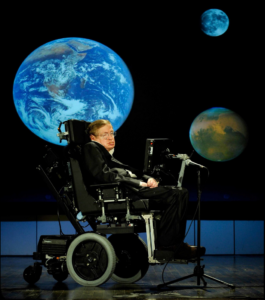He demonstrated that Einstein’s general theory of relativity implies space and time would have a beginning in the Big Bang and an end in black holes.
(BBC, March 14, 2018)
Ahhh, right …
 Truth be told, if you’re not a scientist, you’d be wise to keep any tribute to Stephen Hawking brief. Further, to avoid crossing the guardians of, er, disability correctness, you’d better keep it devoid of “ableist” platitudes too.
Truth be told, if you’re not a scientist, you’d be wise to keep any tribute to Stephen Hawking brief. Further, to avoid crossing the guardians of, er, disability correctness, you’d better keep it devoid of “ableist” platitudes too.
The point is that the only thing most people know about his scientific accomplishments is the title of his bestselling book A Brief History of Time. Hawking was too kind (or too smart) to ever say, but the implied subtitle is “Physics for Dummies.”
It was published in 1988. And people bragged about reading it back then the way they brag about getting “Likes” today.
It is no surprise, then, that the most remarkable thing about this book is the way it makes dummies of non-scientists who try to explain it. This, despite its dumbed-down narrative.
As it happened, I never followed fashion by bragging about reading it. In fact, I’m on record confessing my black hole of a brain … when it comes to the scientific matters he wrote about:
Not since Stephen Hawking’s A Brief History of Time: From the Big Bang to Black Holes has there been so much media hype about a subject so few people know anything about. Hell, the C my college professor gave me in Physics 101 was an act of charity.
(“The God Particle? Hardly…,” The iPINIONS Journal, July 7, 2012)
Of course, there’s no denying Hawking’s “beautiful mind” or his visionary contributions to the study of the universe. But there’s also no denying that his failure to win a coveted Nobel Prize casts a little shade on his hagiography.
What’s more, I question the singular praise he got for popularizing science. After all, if any scientist deserved such praise, it was Isaac Asimov. Frankly, even scientists like Neil deGrasse Tyson, Michio Kaku, and Bill Nye “the Science Guy” seem worthier.
 Meanwhile, if they haven’t seen his biopic The Theory of Everything (2014), the only thing most people know about Hawking’s private life is that he was wheelchair bound and spoke through a voice synthesizer. His physical disabilities stemmed from a diagnosis of ALS (or Lou Gherig’s disease) in 1963, when he was 21.
Meanwhile, if they haven’t seen his biopic The Theory of Everything (2014), the only thing most people know about Hawking’s private life is that he was wheelchair bound and spoke through a voice synthesizer. His physical disabilities stemmed from a diagnosis of ALS (or Lou Gherig’s disease) in 1963, when he was 21.
But, since his mind’s the thing, I see no point in commenting on skeletons like alleged marital infidelities and spousal abuse (against him).
All the same, I should note that, as celebrated as he was, Hawking never seemed more animated than when he was hanging out with Hollywood celebrities. And those celebrities seemed to cherish the gravitational pull of his reflected glory. Never mind that the promotional pictures they never failed to publish always looked like the ones tourists take with Mickey Mouse on visits to Disney World.
Hawking was clearly smart enough to fully appreciate the quid pro quo afoot. Only this explains his guest appearance on everything from silly shows like The Simpsons and Futurama to sublime ones like Star Trek: The Next Generation and The Big Bang Theory.
That said, what I admired most about Hawking was his rejection of a knighthood.
Reports are that he did so to protest the British government’s lack of funding for scientific studies and research. But I wish it was to protest the inherent affront the monarchy poses to fundamental democratic principles – the most notable of which is that all men (and women) are created equal.
I have vented my contempt for this abiding affront in commentaries like “Pardon Me, Sir, but How Much Did You Pay for Your Knighthood,” July 14, 2006, and “Australia Bans British Honours. Other Commonwealth Countries Should too,” November 3, 2015.
Keeping it (relatively) brief, I shall end by sharing that Hawking died on Wednesday at his home in Cambridge, England. He was 76.
Farewell, professor.
Related commentaries:
God particle…
Ban British honours
